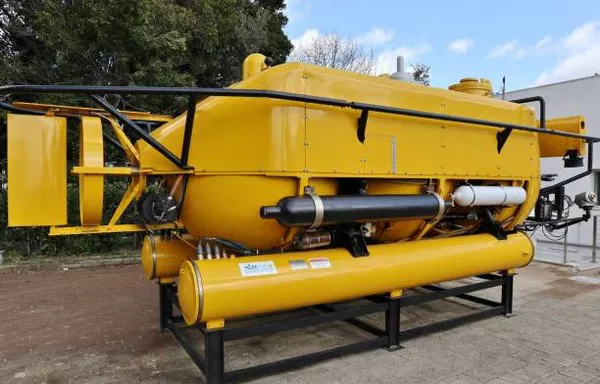In regions where power outages are common or during emergencies, having a backup generator can be crucial for maintaining comfort and safety, especially if you rely on a heat pump for heating and cooling your home. However, selecting the correct size generator to run your heat pump efficiently is essential to ensure it operates effectively without risking damage. In this guide, we’ll delve into the key considerations and steps involved in choosing the right generator size for your heat pump.
Understanding Heat Pumps
Before determining generator size, it’s important to understand how heat pumps function. Heat pumps are efficient HVAC systems that provide both heating and cooling by transferring heat between indoor and outdoor environments. They require electrical power to operate compressors and fans.
Generator Sizing Basics
The first step in selecting a generator is understanding the power requirements of your heat pump. Heat pumps vary in size and efficiency, and their power needs are measured in watts or kilowatts (kW). The power requirement depends on the heat pump’s capacity, typically measured in tons or British Thermal Units (BTUs) per hour.
Calculate Starting and Running Wattage
Running Wattage: This is the continuous power your heat pump needs to operate under normal conditions. Refer to your heat pump’s specifications for the running wattage. For example, a heat pump might require 3,000 watts (or 3 kW) to run continuously.
Starting (or Surge) Wattage: Heat pumps require additional power when they start up due to compressor and fan motor startup demands. This surge typically lasts for a few seconds. Refer to your heat pump’s specifications for the starting wattage, which can be significantly higher than the running wattage. For instance, a heat pump might need 6,000 watts (or 6 kW) during startup.
Generator Size Calculation
To determine the right generator size, follow these steps:
Identify Starting Wattage: Find out the starting wattage requirement of your heat pump.
Add Other Loads: Consider other appliances or devices you want to power simultaneously during an outage, such as lights, refrigerators, or electronics. Add their wattage requirements to the heat pump’s starting wattage to calculate the total starting wattage.
Select Generator Size: Choose a generator that can handle at least the total starting wattage. It’s advisable to select a generator with a higher wattage capacity to accommodate unexpected power surges and ensure optimal performance.
Example Calculation
Suppose your heat pump requires 6,000 watts to start and 3,000 watts to run continuously. Additionally, you want to power a few lights (300 watts) and a refrigerator (700 watts) during an outage.
Total Starting Wattage = Heat Pump Starting Wattage + Other Loads = 6,000 watts + 300 watts + 700 watts = 7,000 watts
In this scenario, you would need a generator with a capacity of at least 7,000 watts (or 7 kW) to safely power your heat pump and other essentials.
Types of Generators
There are several types of generators suitable for powering heat pumps during outages:
Portable Generators: These are versatile and can be moved to different locations. They are available in various wattages and fuel types (gasoline, propane, diesel).
Standby (or Whole House) Generators: These are permanently installed and automatically switch on during a power outage. They can power multiple circuits or your entire home, including the heat pump.
Factors Influencing Generator Size
Several factors can influence the size of the generator you need:
Heat Pump Size: Larger heat pumps require more power.
Climate: Heat pumps in colder climates might need to work harder, requiring more power.
Efficiency: High-efficiency heat pumps might have lower power demands.
Other Loads: Consider other appliances or devices you want to power during an outage.
Generator Sizing Guidelines
To ensure you select the right generator size, consider these guidelines:
Overestimate: It’s safer to choose a generator with a higher wattage capacity than your calculated requirement to accommodate unexpected loads or power surges.
Consult Manuals: Refer to your heat pump and generator manuals for specific wattage requirements and installation guidelines.
Professional Advice: If unsure, consult with an HVAC professional or generator specialist to assess your specific needs.
Common Generator Sizes for Heat Pumps
The size of the generator you need will depend on your heat pump’s requirements. Here are common generator sizes based on wattage:
3,000 – 5,000 Watts: Suitable for smaller heat pumps and basic household needs.
5,000 – 7,000 Watts: Ideal for mid-sized heat pumps and additional essential appliances.
7,000 – 10,000 Watts: Suitable for larger heat pumps and running multiple appliances simultaneously.
See Also What Is A Good Generator For Power Outages
Conclusion
Choosing the right size generator for your heat pump is critical for ensuring your comfort and safety during power outages. By understanding your heat pump’s wattage requirements, considering other power needs, and following sizing guidelines, you can select a generator that meets your needs effectively. Remember to prioritize safety and consult with professionals if needed to ensure proper installation and operation. With the right generator, you can maintain a comfortable living environment even during unexpected power disruptions.

